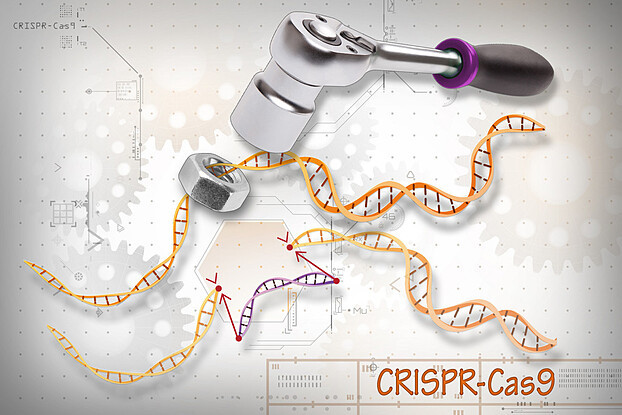 The new genome-editing technology known as CRISPR-Cas9 has transformed our ability to manipulate the genomes of almost any organism, providing an unprecedented opportunity for new fundamental understanding in biology. At the same time, this technology has raised ethical concerns in both biomedical and environmental arenas.
The new genome-editing technology known as CRISPR-Cas9 has transformed our ability to manipulate the genomes of almost any organism, providing an unprecedented opportunity for new fundamental understanding in biology. At the same time, this technology has raised ethical concerns in both biomedical and environmental arenas.
On Monday, April 24, 2017 we heard from two scientists using CRISPR technology to understand the role of genes in controlling the sensitivity or resistance of humans and wildlife to environmental chemicals, including those found at Superfund sites. Dr. Mark Hahn of the Boston University Superfund Research Program and Woods Hole Oceanographic Institution discussed the use of targeted CRISPR to understand the mechanisms of evolved resistance to polychlorinated biphenyls in populations of fish living in contaminated sites. Dr. Christopher Vulpe of the University of Florida discussed the use of untargeted, genome-wide CRISPR-based screens in human cells to identify genes involved in mechanisms of toxicity of arsenic and toxic aldehydes. Dr. Wendy Heiger-Bernays of Boston University provided an overview of some of the ethical questions raised by use of CRISPR in other contexts.
Featured Speakers
 Chris Vulpe, MD, PhD, is a Professor at the University of Florida, Gainesville in the Center for Environmental and Human Toxicology. Dr. Vulpe’s group uses systems level approaches in eukaryotes from yeast to people to identify the functional components that respond to and modulate the consequences of environmental stressors. Currently, his laboratory has been utilizing genome-wide CRISPR screens to understand the mechanisms of toxicity of environmental chemicals. Dr. Vulpe is an author or co-author on >125 papers in peer-reviewed journals and books. Dr. Vulpe received his MD and PhD from the University of California, San Francisco.
Chris Vulpe, MD, PhD, is a Professor at the University of Florida, Gainesville in the Center for Environmental and Human Toxicology. Dr. Vulpe’s group uses systems level approaches in eukaryotes from yeast to people to identify the functional components that respond to and modulate the consequences of environmental stressors. Currently, his laboratory has been utilizing genome-wide CRISPR screens to understand the mechanisms of toxicity of environmental chemicals. Dr. Vulpe is an author or co-author on >125 papers in peer-reviewed journals and books. Dr. Vulpe received his MD and PhD from the University of California, San Francisco.
 Mark E. Hahn, PhD, is a Senior Scientist at the Woods Hole Oceanographic Institution (WHOI) in Woods Hole, MA. He also serves as a project Principal Investigator in both the Boston University Superfund Research Program (BUSRP) and the Woods Hole Center for Oceans and Human Health (WHCOHH). He conducted postdoctoral research at WHOI before being appointed to the scientific staff in 1992. Dr. Hahn studies molecular mechanisms of toxicity following exposure to chemicals found in the marine environment as well as the molecular evolution of genes involved in those mechanisms. The focus of his BUSRP research is on mechanisms of adaptation and evolved resistance to chemicals in fish following long-term chemical exposure at Superfund sites. Dr. Hahn is author or co-author of >150 papers in peer-reviewed journals and books. Dr. Hahn received his PhD in Environmental Toxicology from the University of Rochester School of Medicine and Dentistry in Rochester, NY.
Mark E. Hahn, PhD, is a Senior Scientist at the Woods Hole Oceanographic Institution (WHOI) in Woods Hole, MA. He also serves as a project Principal Investigator in both the Boston University Superfund Research Program (BUSRP) and the Woods Hole Center for Oceans and Human Health (WHCOHH). He conducted postdoctoral research at WHOI before being appointed to the scientific staff in 1992. Dr. Hahn studies molecular mechanisms of toxicity following exposure to chemicals found in the marine environment as well as the molecular evolution of genes involved in those mechanisms. The focus of his BUSRP research is on mechanisms of adaptation and evolved resistance to chemicals in fish following long-term chemical exposure at Superfund sites. Dr. Hahn is author or co-author of >150 papers in peer-reviewed journals and books. Dr. Hahn received his PhD in Environmental Toxicology from the University of Rochester School of Medicine and Dentistry in Rochester, NY.
This call was moderated by Dr. Wendy Heiger-Bernays. It lasted for 1 hour and was recorded for our call archive.
